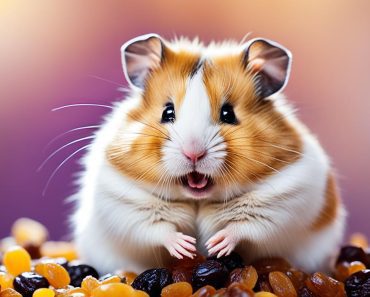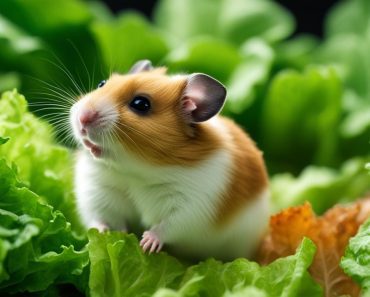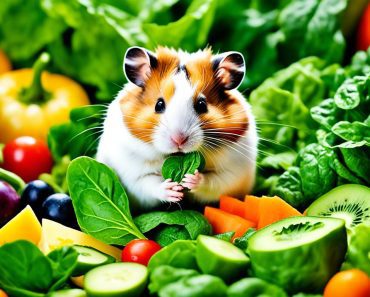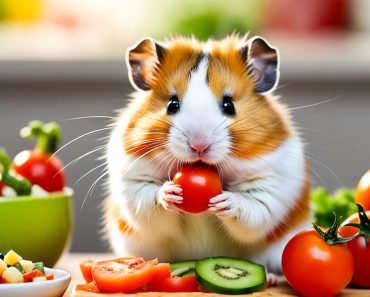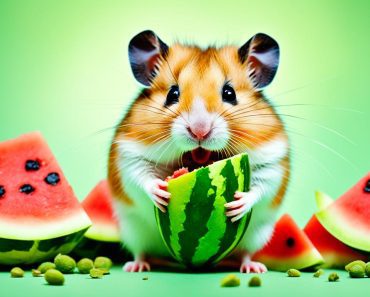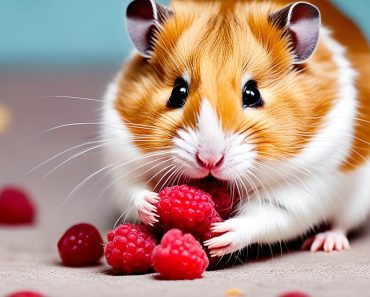Are you a hamster owner wondering if peanuts are a safe snack for your furry friend? You’ve come to the right place! As an experienced hamster owner myself, I’ve done the research to answer all your questions about hamsters and peanuts.
Peanuts can indeed be a part of a hamster’s diet, but it’s important to follow certain guidelines to ensure their safety and well-being. In this article, I’ll explain whether hamsters can eat peanuts, how they can benefit from them, and any risks involved. Let’s dive in!
Can Hamsters Eat Peanuts? Yes, they can.
- Peanuts are safe for hamsters in moderation, without any added flavors, oil, sugar, or salt.
- They provide important nutrients like protein, fats, carbohydrates, fiber, and essential minerals.
- Overfeeding peanuts can lead to stomach problems, obesity, and diabetes in hamsters.
- Include high-quality pelleted hamster food alongside peanuts for a balanced diet.
- Other nuts like cashews and walnuts can also be enjoyed by hamsters in small amounts.
Are Peanuts Good for Hamsters?
When it comes to hamsters, peanuts can be a beneficial addition to their diet when given in moderation. These small legumes provide essential nutrients that help maintain and build healthy bones, muscles, cartilage, and skin in our furry friends.
Not only do peanuts offer energy storage, but they also improve digestion due to their fiber content. Furthermore, peanuts support acid-base balance, nerve-impulse transmission, and enzymatic reactions, contributing to the overall well-being of hamsters.
Benefits of Peanuts for Hamsters
- Provide essential nutrients for bone, muscle, cartilage, and skin health
- Offer energy storage for active hamsters
- Improve digestion due to fiber content
- Support acid-base balance and nerve-impulse transmission
- Aid in enzymatic reactions for normal bodily functions
However, it’s important to note that peanuts should not replace a hamster’s primary diet. Including high-quality pelleted hamster food is crucial to ensure a balanced nutrition intake. These specially formulated foods are designed to meet the nutritional requirements of hamsters and should make up the majority of their diet. Peanuts can be added as a supplement or occasional treat to provide extra variety and enrichment.
Remember to always feed plain, unsalted peanuts to your hamster. Avoid giving flavored or salted varieties, as these can be harmful to their health. Additionally, it’s essential to keep track of the number of peanuts fed to your hamster. Limit their consumption to one or two peanuts per week to prevent overfeeding and potential health issues.
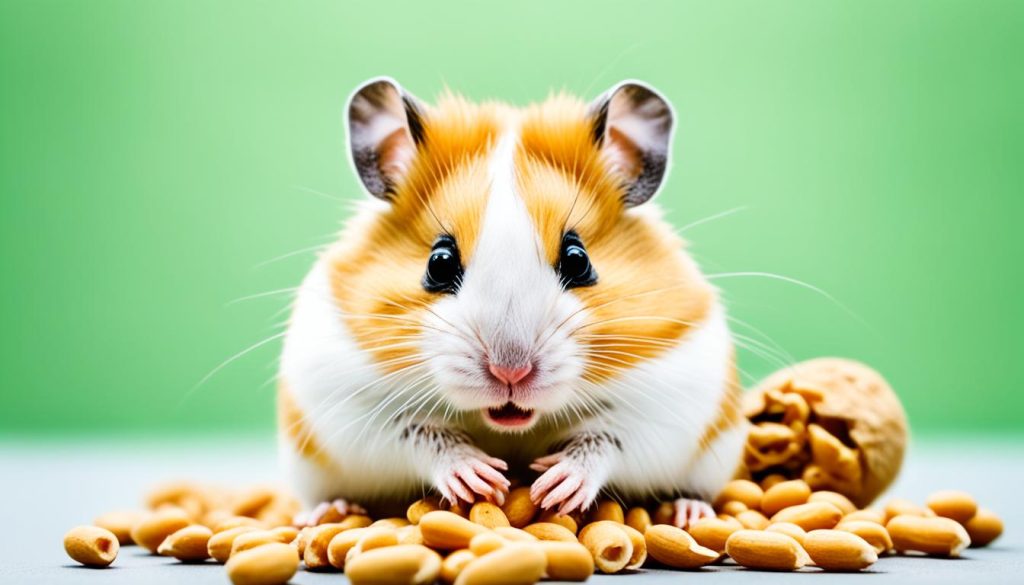
Hamster Food List: Healthy Snacks
- Fresh fruits and vegetables (in moderation)
- Seeds (sunflower, pumpkin, flaxseed)
- Plain unsalted nuts (limited quantity)
- Occasional treats like cooked lean meats or baby food
Providing a balanced and varied diet is essential for your hamster’s overall health and happiness. Alongside peanuts, make sure to include a variety of other healthy snacks, such as fresh fruits and vegetables (in moderation), seeds like sunflower or pumpkin, and occasional treats like cooked lean meats. Together, these foods will ensure that your hamster receives the necessary nutrients for a thriving life.
Risks of Eating Peanuts
While peanuts can be beneficial, overfeeding them can pose risks to hamsters. Consuming too many peanuts can lead to stomach problems like bloating, abdominal cramps, and diarrhea. The high fat content in peanuts can also contribute to obesity and diabetes, which hamsters are already prone to.
Additionally, hamsters have a habit of hiding food, so it’s important to check their cages regularly for any hidden peanuts or snacks to prevent mold growth and health issues.
It’s important to monitor the amount of peanuts you feed to your hamster and ensure it is done in moderation. Peanuts should not be the primary source of nutrition for hamsters but should be given as occasional treats. A varied and balanced diet is crucial for the overall health and well-being of your furry friend.
Can Hamsters Eat Other Types of Nuts?
Hamsters can enjoy a variety of nuts, including cashews and walnuts, in their diet. However, it’s essential to remember that nuts should be given in small amounts and limited to one or two nuts per week to prevent any potential health issues.
Cashews are a popular choice as they are rich in healthy fats, protein, and fiber. They provide a good source of energy for hamsters, and their crunchy texture can be enjoyable for them to munch on. Walnuts, on the other hand, are high in omega-3 fatty acids, which can support brain health and promote a shiny coat for your furry friend.
While these nuts can be beneficial for hamsters, it’s crucial to avoid certain types. Bitter almonds should be avoided as they contain a compound that can be metabolized into cyanide, which is toxic for hamsters. Stick to safe varieties like cashews and walnuts to ensure your hamster’s well-being.
Remember that a varied and balanced diet is key to keeping your hamster happy and healthy. Nuts should be incorporated as a small part of their overall diet, alongside other essential components such as high-quality pelleted hamster food, fresh vegetables, and occasional fruits.
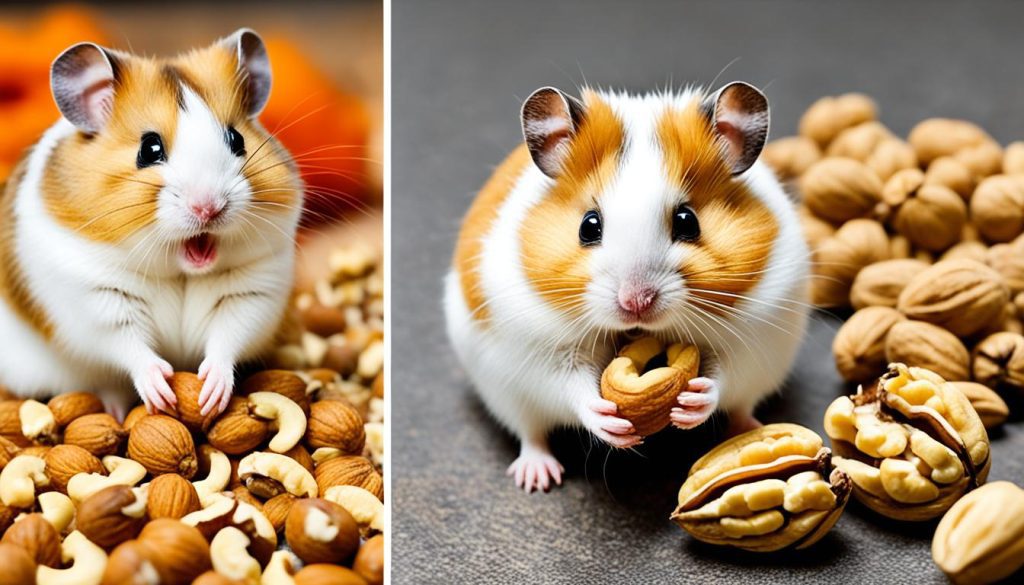
Frequently Asked Questions
Many hamster owners have questions about their furry friends’ nut preferences and their ability to consume peanut shells. Let’s address some common queries:
Do hamsters like nuts?
While peanuts are technically legumes, hamsters often enjoy their crunchy texture, flavorful taste, and pleasant aroma. However, it’s important to remember that each hamster is unique, and their individual preferences may vary. Some hamsters may absolutely adore nuts, while others may be less interested.
Can hamsters eat peanut shells?
No, hamsters should not eat peanut shells. Peanut shells are indigestible and can cause choking hazards or digestive issues if consumed. It is recommended to remove any leftover shells from the cage to keep it clean and provide a safe environment for your hamster.
Conclusion
Including peanuts in a hamster’s diet can be a safe and enjoyable addition when done in moderation. Peanuts offer important nutrients such as protein, fats, carbohydrates, fiber, and essential minerals like potassium, phosphorus, and magnesium. However, it’s crucial to ensure that the peanuts are plain and free from added salt, sugar, oil, or flavors.
Overfeeding peanuts to hamsters can lead to stomach problems, obesity, and diabetes, as hamsters are prone to these conditions. It’s essential to monitor their intake and limit their consumption to one or two peanuts per week. Additionally, it’s advisable to check the ingredients if using peanut butter and provide unsalted, pure peanut butter in small amounts.
A balanced and varied diet is key to maintaining a hamster’s overall health and happiness. Alongside peanuts, it’s important to offer high-quality pelleted hamster food that provides a balanced nutrition intake. Always observe your hamster’s eating habits and consult with a veterinarian if any health issues arise. By providing the right diet and monitoring their intake, you can keep your hamster thriving and enjoying the occasional peanut treat.

